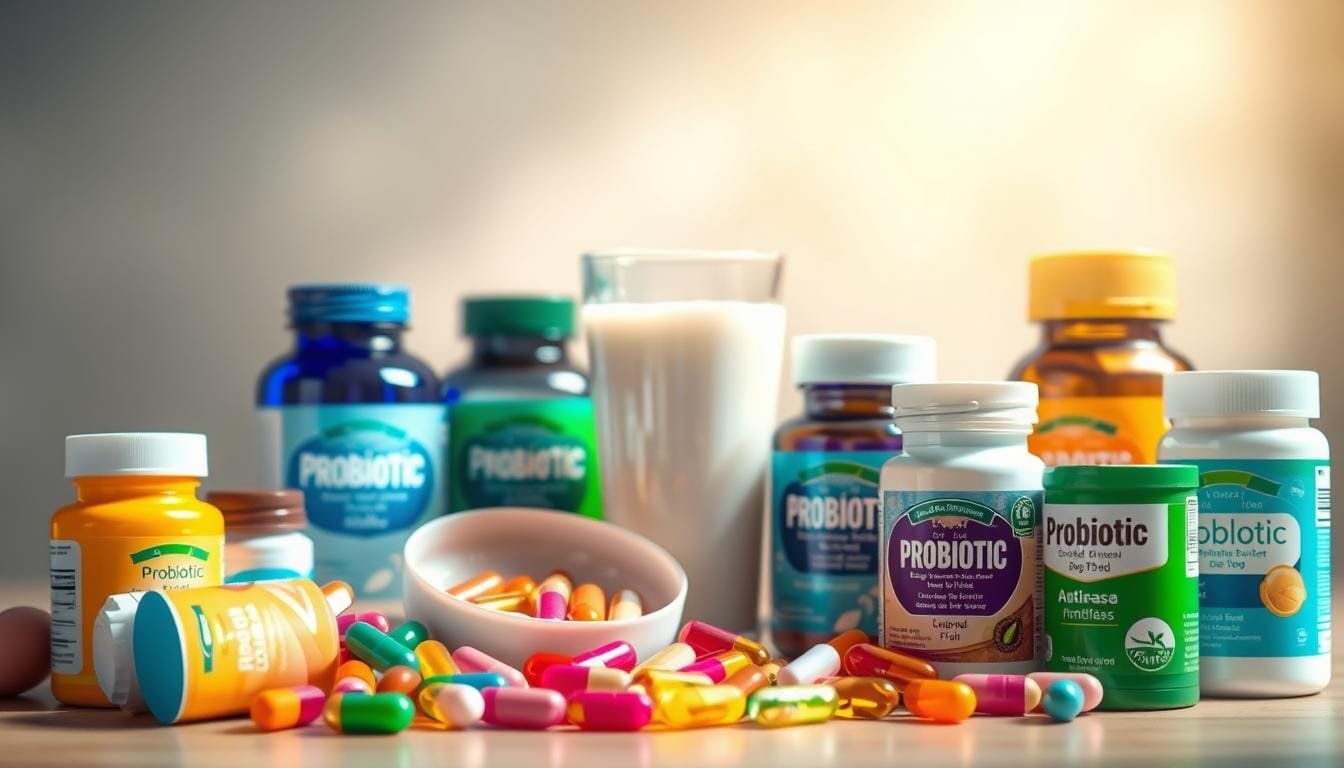Currently Empty: RM0.00
Did you know that over 70% of the immune system is linked to the stomach? This surprising fact highlights the importance of gut health, especially for those dealing with lactose intolerance. Wellness Concept, a trusted name in health and wellness, is here to guide you through managing this condition effectively.
Living with lactose intolerance can be challenging, but incorporating the right solutions can make a significant difference. This article explores how certain live microorganisms can support digestive health and ease discomfort. Wellness Concept emphasizes expert-backed advice to help you make informed decisions.
Readers in Malaysia can connect with Wellness Concept via WhatsApp at +60123822655. The company operates Monday to Friday from 9:30 am to 6:30 pm and Saturday from 10:00 am to 5:00 pm. Whether you’re seeking personalized guidance or detailed information, their team is ready to assist.
Stay tuned as this article dives into research findings, practical tips, and actionable steps to improve your well-being. From understanding the science behind it to applying it in daily life, Wellness Concept ensures you have all the tools you need.
Key Takeaways
- Over 70% of the immune system is connected to gut health.
- Wellness Concept offers expert advice on managing digestive issues.
- Contact Wellness Concept via WhatsApp at +60123822655 for support.
- Business hours are Monday to Friday, 9:30 am to 6:30 pm, and Saturday, 10:00 am to 5:00 pm.
- This article provides research-backed insights and practical tips.
Introduction to Lactose Intolerance and Probiotics
The gut plays a vital role in overall health, influencing everything from digestion to immunity. For those experiencing digestive discomfort, understanding the root causes and effective solutions is key. This section explores the basics of gut health, focusing on two important topics: probiotics and lactose intolerance.
What Are Probiotics?
Probiotics are live microorganisms that support digestive health. They help maintain a balanced gut environment, which is essential for proper digestion and immune function. These beneficial bacteria can be found in certain foods, like yogurt, or taken as supplements.
Research shows that probiotics can improve gut flora, reduce inflammation, and enhance nutrient absorption. Choosing the right product is crucial for maximizing these benefits. Not all probiotics are the same, so it’s important to select one tailored to your needs.
An Overview of Lactose Intolerance
Lactose intolerance occurs when the body doesn’t produce enough lactase, the enzyme needed to digest lactose, a sugar found in milk and dairy products. Without enough lactase, lactose remains undigested, leading to symptoms like bloating, gas, and diarrhea.
For many, consuming milk or dairy can trigger these uncomfortable symptoms. However, not all dairy products affect individuals the same way. Hard cheeses, for example, contain less lactose and may be better tolerated.
Managing lactose intolerance often involves dietary adjustments. Traditional methods include avoiding dairy or using lactase supplements. However, probiotic products offer an alternative approach by improving gut health and potentially reducing symptoms.
| Method | Benefits | Limitations |
|---|---|---|
| Lactase Supplements | Immediate relief for some | May not work for everyone |
| Probiotics | Improves gut health long-term | Results vary by individual |
| Dairy Avoidance | Prevents symptoms entirely | May lead to nutrient deficiencies |
By understanding these options, individuals can make informed decisions to support their digestive health. The next sections will delve deeper into the science and practical steps for managing lactose intolerance effectively.
Understanding Lactose Intolerance: Causes and Symptoms
Lactose intolerance affects millions worldwide, but understanding its causes can help manage symptoms effectively. This condition occurs when the body lacks enough lactase, the enzyme needed to digest lactose, a sugar found in milk and dairy products. Without lactase, undigested lactose moves to the colon, causing discomfort.
Primary and Secondary Causes
Primary lactose intolerance is the most common type. It develops as lactase production decreases with age, often starting in adolescence. This is genetically influenced, with higher prevalence in certain ethnic groups, such as Asians and Native Americans.
Secondary lactose intolerance can occur due to damage to the small intestine. This may result from infections, surgeries, or chronic conditions like Crohn’s disease. In such cases, lactase production is temporarily reduced.
Common Food Triggers
Certain foods are more likely to trigger symptoms. These include:
- Milk and cream
- Cheese and yogurt
- Butter and ice cream
Hard cheeses and fermented dairy products often contain less lactose and may be better tolerated. However, reactions vary by individual.
Gastrointestinal Reactions
Symptoms typically appear 30 minutes to 2 hours after consuming lactose-containing foods. Common reactions include:
- Bloating and gas
- Abdominal cramps
- Diarrhea
These symptoms occur because undigested lactose ferments in the colon, producing gas and drawing water into the intestines.
Role of Supplements
A supplement containing lactase enzyme can help manage symptoms. These products break down lactose before it reaches the colon, reducing discomfort. However, effectiveness varies, and it’s essential to choose a high-quality supplement.
| Method | Benefits | Limitations |
|---|---|---|
| Lactase Supplements | Immediate relief for some | May not work for everyone |
| Dairy Avoidance | Prevents symptoms entirely | May lead to nutrient deficiencies |
| Fermented Dairy | Lower lactose content | Not suitable for severe cases |
Understanding specific symptom lactose reactions is crucial for effective management. By identifying triggers and exploring solutions like supplements, individuals can improve their quality of life.
Probiotics for lactose intolerance: How They Improve Digestion
Managing digestive discomfort can be easier with the right approach. Live microorganisms play a key role in breaking down lactose, making it easier for the body to process. This process is especially helpful for those who struggle with dairy consumption.

Mechanisms of Action
These beneficial bacteria produce an enzyme called beta-galactosidase. This enzyme helps digest lactose by breaking it into simpler sugars, glucose, and galactose. This reduces the amount of undigested lactose that reaches the colon, minimizing discomfort.
Research shows that certain strains, like Lactobacillus acidophilus and Bifidobacterium lactis, are particularly effective. They not only aid in lactose digestion but also improve overall gut health.
Enhancing Gut Microbiota Balance
Live microorganisms also help balance the gut microbiota. A healthy gut environment supports better digestion and nutrient absorption. Fermented dairy products, like yogurt and kefir, are excellent sources of these beneficial bacteria.
Studies indicate that regular consumption of fermented dairy can reduce symptoms like bloating and diarrhea. This makes it easier for individuals to enjoy dairy products without discomfort.
| Strain | Function | Benefits |
|---|---|---|
| Lactobacillus acidophilus | Produces beta-galactosidase | Reduces bloating and gas |
| Bifidobacterium lactis | Enhances gut flora | Improves nutrient absorption |
| Lactobacillus rhamnosus | Supports immune function | Reduces digestive discomfort |
By understanding these mechanisms, individuals can make informed choices to support their digestive health. Incorporating live microorganisms into the diet can lead to significant improvements in comfort and well-being.
Step-by-Step Guide to Incorporating Probiotics into Your Diet
Adding beneficial bacteria to your daily routine can transform your digestive health. Whether you’re managing discomfort or simply aiming for better gut health, this guide will help you integrate probiotics seamlessly into your lifestyle.
Practical Preparation and Application
Start by choosing the right source of beneficial bacteria. Fermented foods like yogurt, kefir, and sauerkraut are excellent options. For those who prefer supplements, look for products containing strains like Lactobacillus acidophilus or Bifidobacterium lactis.
Preparation is key. If using fermented foods, ensure they are fresh and stored properly to maintain their potency. For supplements, follow the manufacturer’s instructions carefully. Consistency in preparation ensures maximum benefits for your gut.
Dosage, Timing, and Consistency
Dosage matters. Studies suggest a daily intake of 10^8 to 10^9 CFU (colony-forming units) for optimal results. This ensures enough bacteria survive the digestive process to reach the gut and exert their benefits.
Timing is equally important. Taking probiotics with meals can enhance their survival rate. Consistency is crucial—regular intake helps maintain a balanced gut environment and supports lactase activity, reducing symptom lactose intolerance.
| Aspect | Recommendation | Benefits |
|---|---|---|
| Dosage | 10^8 to 10^9 CFU daily | Ensures effective gut colonization |
| Timing | With meals | Improves bacterial survival |
| Consistency | Daily intake | Maintains gut balance |
By following these steps, you can enhance your diet and improve your digestive health. Remember, small, consistent changes lead to lasting results.
Choosing the Right Probiotic Supplement for Your Needs
Selecting the right supplement can significantly impact your digestive health and overall well-being. With so many options available, it’s essential to understand what makes a product effective. This section provides information on key strains and tips for reading labels to help you make an informed choice.
Key Strains to Consider
Not all beneficial bacteria are the same. Research highlights specific strains that support digestive health. Lactobacillus acidophilus and Bifidobacterium lactis are among the most studied. These strains help break down lactose and improve microbiota balance.
Clinical studies show that these strains reduce bloating and enhance nutrient absorption. When choosing a supplement, look for these strains on the label. They are often found in high-quality products designed for digestive support.
Tips for Reading Product Labels
Understanding product labels is crucial for selecting the right supplement. Look for the CFU (colony-forming units) count, which indicates the number of live bacteria. A daily dose of 10^8 to 10^9 CFU is recommended for optimal results.
Check the ingredient list for strains like Lactobacillus acidophilus or Bifidobacterium lactis. Avoid products with unnecessary additives. Proper storage is also important—some supplements require refrigeration to maintain potency.
For more information on the benefits of these products, visit this article.
| Strain | Function | Recommended CFU |
|---|---|---|
| Lactobacillus acidophilus | Breaks down lactose | 10^8 to 10^9 |
| Bifidobacterium lactis | Improves microbiota balance | 10^8 to 10^9 |
| Lactobacillus rhamnosus | Supports immune function | 10^8 to 10^9 |
By focusing on these details, you can choose a supplement that aligns with your needs. Always consult a healthcare professional for personalized advice.
The Role of Fermented Foods and Enzymes in Digestive Health
Fermented foods have been a staple in diets for centuries, offering both flavor and health benefits. The process of fermentation transforms ordinary ingredients into nutrient-rich powerhouses. These foods are particularly beneficial for those seeking to improve their digestive health.

Fermentation breaks down complex compounds, making foods easier to digest. This process also produces beneficial bacteria and enzymes that support the body’s natural functions. By incorporating fermented foods into your diet, you can extend digestion time, allowing for better nutrient absorption.
Examples of Fermented Dairy and Non-Dairy Options
Fermented dairy products like yogurt and kefir are popular choices. These foods contain live cultures that help break down lactose, reducing its effect on the digestive system. Non-dairy options, such as sauerkraut and kimchi, offer similar benefits without the lactose content.
Here are some examples of fermented foods and their advantages:
- Yogurt: Rich in probiotics, it supports gut health and improves digestion.
- Kefir: A fermented milk drink that aids in lactose digestion.
- Sauerkraut: Fermented cabbage that enhances gut microbiota balance.
- Kimchi: A spicy Korean dish that promotes digestive health.
These foods not only improve digestion but also provide essential nutrients. For example, fermented dairy products are rich in calcium and vitamin B12, while non-dairy options like kimchi offer vitamins A and C.
How Fermented Foods Enhance Enzyme Activity
Fermented foods naturally contain enzymes that aid in breaking down complex molecules. This process reduces the workload on the body’s digestive system, making it easier to process nutrients. For instance, the enzyme beta-galactosidase in yogurt helps digest lactose, minimizing discomfort.
Studies show that regular consumption of fermented foods can improve enzyme activity over time. This leads to better digestion and reduced gastrointestinal issues. Combining these foods with a balanced diet maximizes their effect on overall health.
| Food | Key Benefit | Enzyme Activity |
|---|---|---|
| Yogurt | Breaks down lactose | |
| Kefir | Improves gut flora | |
| Sauerkraut | ||
| Kimchi |
Incorporating fermented foods into your daily meals is simple. Start with small servings and gradually increase as your body adjusts. Pairing these foods with a balanced diet ensures you reap their full benefits.
Scientific Research and Evidence on Probiotics and Lactose Intolerance
Scientific research continues to uncover the powerful role of beneficial bacteria in managing digestive challenges. Studies highlight how specific strains and enzymes can improve digestion and reduce discomfort. This section dives into clinical trials and findings to provide a clear understanding of the science behind these solutions.
Review of Clinical Studies and Trials
Clinical trials have shown promising results for certain strains. For example, Lactobacillus acidophilus DDS-1 has been effective in reducing symptoms. This strain produces an enzyme called beta-galactosidase, which breaks down lactose into simpler sugars.
Another trial involving Bifidobacterium lactis demonstrated improved gut health and reduced bloating. These findings suggest that specific strains can make a significant difference in managing digestive issues.
“The use of beneficial bacteria in clinical settings has opened new doors for managing digestive discomfort effectively.”
Interpreting Research Findings
Understanding research data can be challenging. To make sure you interpret findings correctly, focus on the methodology and sample size. Larger studies with diverse participants often provide more reliable results.
For instance, a meta-analysis of 15 randomized double-blind studies found a positive relationship between beneficial bacteria and symptom reduction. However, the strength of evidence varied, highlighting the need for further research.
| Strain | Key Finding | Enzyme Activity |
|---|---|---|
| Lactobacillus acidophilus DDS-1 | Reduces bloating and gas | Beta-galactosidase |
| Bifidobacterium lactis | Improves gut flora | Lactic acid bacteria |
| Lactobacillus reuteri | Supports immune function | Antimicrobial compounds |
To make sure you stay informed, consult reputable sources like this systematic review. It provides a comprehensive analysis of the effectiveness of beneficial bacteria in managing digestive issues.
Wellness Concept: Expert Advice, Business Hours, and How to Connect
Connecting with wellness experts can make a significant difference in managing digestive discomfort effectively. Wellness Concept is dedicated to providing personalized guidance to help you achieve optimal health. Their team of professionals is ready to assist you with tailored solutions and expert advice.
Contact Details and Operating Hours
Wellness Concept makes it easy to get the support you need. You can reach them via WhatsApp at +60123822655. Their business hours are Monday to Friday, 9:30 am to 6:30 pm, and Saturday, 10:00 am to 5:00 pm. Whether you have questions or need detailed information, their team is available to help.
The role of expert advice is crucial in managing digestive discomfort. Wellness Concept’s professionals use a result-driven approach to ensure effective solutions. By choosing the right bacteria and strategies, they help you achieve positive health outcomes.
| Service | Details |
|---|---|
| Contact Method | WhatsApp: +60123822655 |
| Business Hours | Mon-Fri: 9:30 am – 6:30 pm, Sat: 10:00 am – 5:00 pm |
| Expert Advice | Tailored solutions for digestive health |
For more information on managing digestive health, visit this article. Wellness Concept is committed to helping you make informed decisions and achieve lasting results. Don’t hesitate to reach out for personalized support today!
Conclusion
Taking control of your digestive health starts with informed choices. Incorporating beneficial bacteria into your routine can significantly improve digestion and reduce discomfort. Research highlights the positive response seen in clinical trials, with specific strains showing promising results.
This content has explored the science behind digestive health, practical tips, and expert-backed strategies. From understanding the root causes to choosing the right treatment, the information provided aims to empower you to manage your condition effectively.
If you’re facing a digestive problem, remember that small, consistent changes can lead to lasting results. For personalized guidance, reach out to Wellness Concept via WhatsApp at +60123822655. Their team is ready to help you achieve optimal health.
Take the first step today—your digestive health is worth it!
FAQ
What are the main symptoms of lactose intolerance?
Common symptoms include bloating, gas, diarrhea, and stomach cramps after consuming dairy products. These occur because the body struggles to break down lactose, a sugar found in milk.
How can probiotics help with lactose digestion?
Probiotics introduce beneficial bacteria into the gut, which can help break down lactose more effectively. This reduces discomfort and improves overall digestive health.
Are there specific probiotic strains that work best for lactose intolerance?
Yes, strains like Lactobacillus acidophilus and Bifidobacterium are particularly effective. They produce lactase, the enzyme needed to digest lactose, easing symptoms.
Can fermented foods help with lactose intolerance?
Absolutely. Fermented foods like yogurt, kefir, and sauerkraut contain live cultures that aid in lactose digestion and support a healthy gut microbiome.
How should I choose a probiotic supplement?
Look for products with well-researched strains, high CFU counts, and clear labeling. Always check for third-party testing to ensure quality and potency.
How long does it take for probiotics to show results?
Results vary, but many people notice improvements within a few weeks. Consistency is key—taking probiotics daily maximizes their benefits.
Can I still consume dairy if I’m lactose intolerant?
Some people can tolerate small amounts of dairy, especially when paired with probiotics or lactase supplements. Experiment to find what works for you.
Are there non-dairy sources of probiotics?
Yes, options like kombucha, miso, and tempeh are excellent non-dairy sources of probiotics that support gut health.
What’s the difference between probiotics and lactase supplements?
Probiotics introduce beneficial bacteria to the gut, while lactase supplements provide the enzyme needed to break down lactose. Both can help but work differently.
Can children take probiotics for lactose intolerance?
Yes, but it’s best to consult a pediatrician first. They can recommend safe and effective options tailored to a child’s needs.



